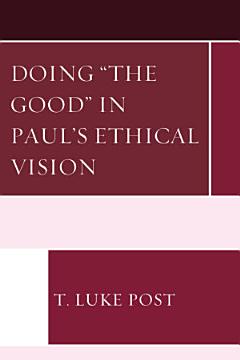Despite the longstanding debate surrounding the relationship between faith and good works in the apostle Paul's writings, no one to date has undertaken a thorough examination of Paul's use of “good” terminology in ethical contexts. This study seeks to fill this gap by examining Paul’s use of ἀγαθός and καλός as these terms appear in his undisputed epistles and in 2 Thessalonians. Surveying a wide terrain of exegetical territory, T. Luke Post makes a compelling case that believers “doing good” is a primary aim of Paul’s theological, social, and ethical agenda.

